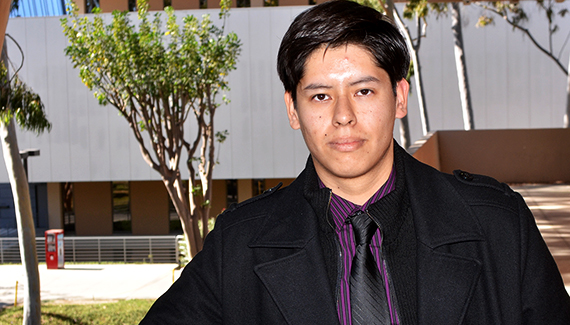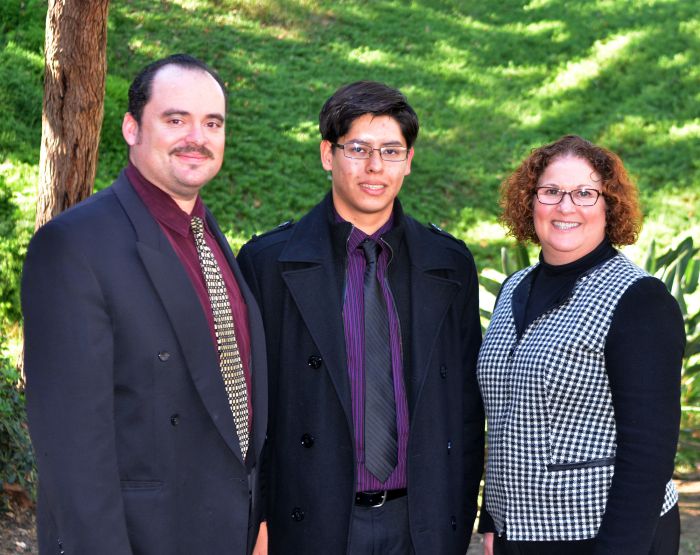
Jeshua Avila, a junior studying biochemistry at California State University, Dominguez Hills (CSUDH), has received a $2,500 scholarship from Phillips 66, which will help him to continue research on a cell membrane protein called gramicidin.
Avila’s interest in cellular research is, in part, a personal pursuit.
“I have been interested in the medical field since I was a little kid, but I also have too many white blood cells, which is another reason I’m studying biochemistry. Sometimes when you have more white blood cells they can end up attacking other [healthy] cells in your body, thinking they are intruders,” said Avila, who has Vitiligo, which is caused by white blood cells attacking skin pigment. “They check my thyroid, and I don’t really have a problem with it now.”
To study the gramicidin ion channel protein, Avila he is using an infrared laser to determine how much light the protein absorbs to determine its structure.
The protein helps to channel material through the cell, or regulate “ionic permeability in cell membranes.” Such molecules are crucial for normal functioning of cells. Defective ion channels are implicated in a number of diseases.
“The work I’m doing is building on other’s research to support the evidence that the structure of a gramicidin protein is helical [spiral in form],” said Avila, a San Pedro resident.
Avila has not decided what he will use the scholarship for yet–possibly textbooks or tuition–which will help ease the cost of going to college so he may focus more on his course work and research.
“I’ve very grateful to Phillips 66 for this great scholarship. It’s good to have more money for tuition, books and other things,” said Avila. “I plan to go to graduate school, so every bit of money I can save now will help.”

The scholarship was officially presented to Avila by Janet Grothe, public affairs manager at Phillips 66.
At Phillips 66, we believe in providing energy and improving lives. We believe that occurs through many scientific avenues. So it’s very important to help develop the scientists of tomorrow. – Janet Grothe
“At Phillips 66, we believe in providing energy and improving lives. We believe that occurs through many scientific avenues. So it’s very important to help develop the scientists of tomorrow,” said Grothe. “I’m very impressed in the individual attention students at CSU Dominguez Hills receive from the faculty and staff, as well as the quality of the guided research that students have access to at the university.”
Avila’s research is made possible through his participation in the Maximizing Access to Research Careers, Undergraduate Student Training in Academic Research Program (MARC U*STAR), which is funded by the National Institutes of Health (NIH). He was selected by CSUDH’s Human Resources office to receive the scholarship.
The MARC U*STAR training program provides six CSUDH honors-level students from low-income families who are studying biomedical and behavioral sciences research support for the last two years of their undergraduate education. The program is designed to help prepare students for and pursue a Ph.D. by paring each with a CSUDH science professor mentor who establishes a project best suited to the student’s level and interests. Avila’s mentor is Kenneth Rodriquez, assistant professor of chemistry at CSUDH.
“Jeshua came by with his mother to learn about our program and talk about taking classes for the fall. He wanted to transfer from Los Angeles Harbor Community College. He brought his transcripts with him–nobody brings their transcripts with them like that,” said Rodriquez. “So I started looking at them and I was so impressed by his physics, his calculus and his chemistry. He got all ‘A’s,’ so I asked him right then if he had ever considered getting a Ph.D. He said ‘What is that?’ I explained to him that he may get a chance to do some biomedical research.”
In the MARC U*STAR, students are also expected to participate in summer research programs at other universities to broaden their depth of experience, as well as discipline-specific conferences where they may present their work. The goal is for them to become competitive enough to apply to Ph.D. programs at top research universities, such as UCLA, Notre Dame and USC.
“It will be hard to lose Jeshua next summer because that’s when I need him most,” said Rodriquez. “But we want him and all the U*STAR students to experience these research universities and what the work they do is like. They spend 10 weeks in a lab full-time at these great universities. It doesn’t get much better than that.”
Avila has already applied to The Ohio State for his summer program in 2016, and will apply to more. During the summer he hopes to get a more specific idea of what he wants to study for his Ph.D. and research during his career.
“After I get my Ph.D., I’d like to work at a hospital doing research. I really want to help people by helping find solutions for medical problems,” said Avila.